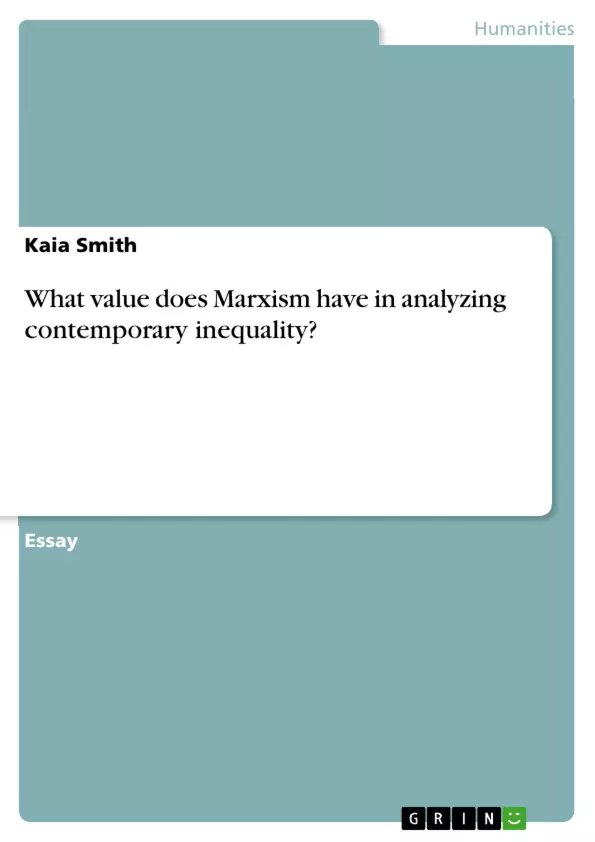(Gramscian) Marxism helps us to uncover the systemic and epistemic conditions that create and reproduce inequalities by critically reflecting on the exploitative mechanisms that govern them and the institutionalized hegemonic power discourses that naturalize exploitation. It is therefore apt to debunk 'trickle-down' as the neoliberal elite narrative that it is and to place the working class individual, and its communal and class self-awareness, at the center of a solution to inequality.
In order to do that, first the exploitative nature of the capitalist mode of production is sketched to attain an economic foundation for a socio-cultural argument and then it is shown that Gramscian cultural hegemony theory offers a more compelling explanation for the persistence of such a capitalist logic premised on exploitation, with no effective resistance by those which are exploited under it.
Inhaltsverzeichnis (Table of Contents)
- Economic Exploitation
- Cultural hegemony
Zielsetzung und Themenschwerpunkte (Objectives and Key Themes)
This essay explores the value of Marxist theories, particularly Gramscian Marxism, in analyzing contemporary inequality. It aims to provide a critical lens for understanding the systemic conditions that perpetuate inequality, particularly in the context of capitalism and its exploitative mechanisms.
- The exploitative nature of capitalism
- The role of cultural hegemony in maintaining inequality
- The importance of individual and collective agency in challenging inequality
- The persistence of inequality despite its negative consequences
- The influence of mass media in shaping public perception and maintaining elite power
Zusammenfassung der Kapitel (Chapter Summaries)
- Economic Exploitation: This section explores the Marxist critique of capitalism, highlighting its inherent exploitative nature. It argues that the capitalist mode of production systematically disadvantages the working class by appropriating their labor value and hindering their agency.
- Cultural hegemony: This section introduces Gramsci's theory of cultural hegemony, which offers an explanation for the persistence of inequality by highlighting the role of ideology and mass media in maintaining elite power. It emphasizes the importance of recognizing and harnessing the agency of the majority in challenging the dominant narrative.
Schlüsselwörter (Keywords)
This essay delves into the realms of Marxist analysis, inequality, exploitation, cultural hegemony, capitalism, and mass media. It emphasizes the importance of understanding the systemic and ideological forces that shape contemporary inequality, particularly the exploitative nature of capitalist production and the role of cultural hegemony in perpetuating social hierarchies.
Frequently Asked Questions
How does Marxism explain contemporary inequality?
Marxism uncovers systemic conditions of inequality by analyzing the exploitative mechanisms of the capitalist mode of production, where labor value is appropriated by the elite.
What is Gramsci's theory of cultural hegemony?
It suggests that the ruling class maintains power not just through force, but by shaping cultural norms and discourses that make exploitation seem "natural" or inevitable to the exploited.
What is the "trickle-down" narrative according to this analysis?
The essay debunks "trickle-down" economics as a neoliberal elite narrative used to justify inequality and prevent resistance from the working class.
Why is class self-awareness important?
Communal and class self-awareness is seen as the center of a solution to inequality, allowing individuals to recognize their systemic exploitation and organize for change.
How does mass media contribute to inequality?
Mass media acts as a tool for cultural hegemony, disseminating the ideologies of the elite and marginalizing alternative perspectives that challenge the status quo.
What is the capitalist mode of production?
It is an economic system characterized by private ownership of the means of production and the extraction of surplus value from workers, which Marxists argue is inherently exploitative.
- Citar trabajo
- Kaia Smith (Autor), 2017, What value does Marxism have in analyzing contemporary inequality?, Múnich, GRIN Verlag, https://www.grin.com/document/387310



